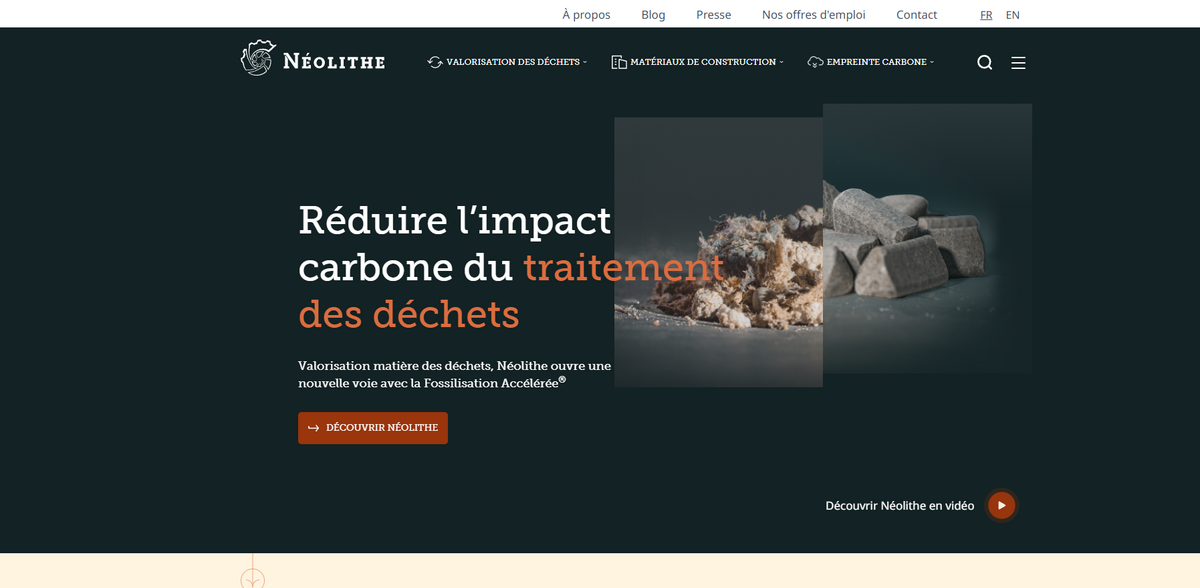What is the Neolithe Project?
Founded in 2019, Neolithe is a company of 200 people located in Anjou near Angers, specializing in the material recovery of non-recyclable, non-hazardous, and non-inert waste – known as DAE (Economic Activity Waste). Neolithe is an industrial startup located in Chalonnes-sur-Loire, and its innovative approach transforms non-recyclable waste into carbon sinks in the form of mineral aggregates usable in construction (BTP). Thanks to its Accelerated Fossilization® process – which emits fewer greenhouse gases – Neolithe ensures the valorization of 100% of waste into mineral aggregates, known as Anthropocite. This approach is a game changer; it offers an alternative to conventional landfilling and incineration and stands as a testament to the future of waste treatment.
Main Benefits and Key Figures
Neolithe’s project is built on clear, ambitious benefits that resonate with today’s environmental and industrial challenges. The main advantages can be summed up in a straightforward manner:
- 5 years of R&D leading to industrialization
- 200 engaged people
- €80 million in cumulative fundraising
- 2 industrial pilots in operation
- 1 industrial campus under construction
This list of key figures demonstrates the project’s solid foundation and its readiness to scale across France. It is truly inspiring to see how dedicated efforts in research and development have smooshed together with industrial prowess!
A Circular Approach to Waste Management
At its core, the Neolithe project is driven by a circular vision for waste: reuse, recycle, and recover. The process starts with a meticulous sorting operation that extracts recyclable materials from waste, ensuring that what can be reused or recycled is promptly redirected. For instance, what can be reused is reused, what can be recycled is recycled, and what can be recovered as material is recovered. Even residues that are not recoverable as materials are processed energetically rather than being wasted. This methodology not only minimizes CO2 emissions compared to current waste treatments but also helps in sequestering carbon – a crucial measure in the fight against climate change.
Innovative Processes: Accelerated Fossilization® and Anthropocite
Neolithe’s technological innovation lies in its groundbreaking Accelerated Fossilization® process, an approach that transforms residual waste into mineral aggregates. These aggregates, branded as Anthropocite, are further used in construction, making them a valuable resource in the building industry. The process is fast, efficient, and significantly reduces greenhouse gas emissions. It may sound a bit technical, but it essentially translates to turning what was once considered waste into a product with tangible industrial applications – a true win-win.
Sustainable Vision Amid Environmental Challenges
The vision embraced by Neolithe is as bold as it is essential: introduce an industrial model that innovates not for the sake of artificial needs but to address concrete environmental emergencies. There is a clear commitment to a circular approach and resource consciousness. The project is a prime example of how industry can be a driving force for change, emphasizing that every step, from reuse to recovery, contributes to a healthier planet. The approach reminds everyone that waste should be seen not as refuse but as a resource waiting to be repurposed, which is both exciting and promising.
Project Impact on Sustainable Development Goals
- SDG 9: Industry, Innovation, and Infrastructure
- SDG 12: Responsible Consumption and Production
- SDG 13: Climate Action
- SDG 11: Sustainable Cities and Communities
Future Prospects and Scaling Developments
Neolithe plans to deploy factories capable of processing 100,000 tons of waste per year – large-scale facilities that will extend across France. These industrial plants, built upon the success and learnings gained from the existing industrial pilot, represent the next step in a robust solution ready to scale. By replicating this innovative model, Neolithe aspires to revolutionize the waste treatment industry and amplify its role in the battle against climate change. This future-oriented vision is a breath of fresh air, promising not only environmental benefits but also economic opportunities as the technology gains traction in the construction and waste management sectors. Each step forward reinforces the notion that a new industrial model, built on sustainability and ingenuity, is well within reach… and that industry can indeed be part of the solution rather than the problem.


















